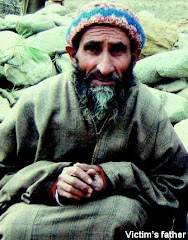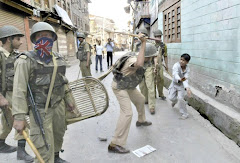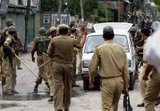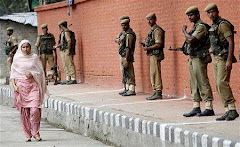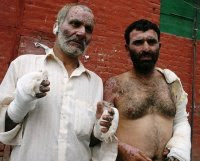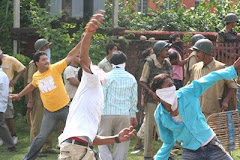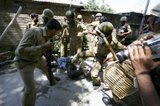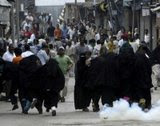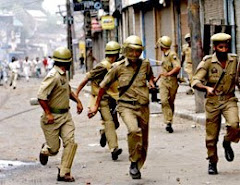State has 26355 widows, 8612 orphans
Courtesy: Daily Rising Kashmir dated August 27th, 2009 by Abid Bashir
Srinagar, Aug 26: The government Wednesday revealed in Assembly that 3429 youth have gone missing in the State since 1990 while the number of orphans and widows stands at 26355 and 8612 respectively. The figures were given by the government in a written reply to a question posed by PDP MLA from Shopian, Abdur Razak Zawoora.
While releasing the figures, government said 3429 youth have gone missing in the State from 1990 till July 2009. “Of these 1062 disappeared from Kashmir while 2367 went missing from Jammu region”. About the number of widows and orphans, the government said there were 8612 widows and 26355 orphans in the State. “Of the 8612 widows, 2267 were the widows of militants, who were killed in different encounters and other incidents while 6345 women lost their husbands to different violence related incidents. Of the 26355 orphans, 20976 lost their family members to violence during the turmoil while 5379 were kins of slain militants.” In the written reply, government stated that the figures about orphans and widows came to fore after a survey was conducted by the Rehabilitation Council to ascertain the number of widows and orphans in the State. “Anganwadi workers supervised by supervisors were part of the survey conducted by the rehabilitation council, which worked under Social Welfare department”.The figures about missing youth were attributed to the home department and not to the survey. To a question posed by the MLA whether government had taken any step to rehabilitate the violence affected victims, the government said, “The rehabilitation council has been rehabilitating the victims of violence in various ways. Widows are getting Rs 750 as monthly pension since April 4, 2008. Besides, the government is also paying marriage assistance to young widows, who want to re-marry.”Talking to Rising Kashmir Minister of Social Welfare, Sakeena Itoo said the Social Welfare department provides marriage assistance not only to the young widows but to the daughters of widows who have attained the marriage age. “All widows collect their monthly pension through banks and as far as the marriage assistance is concerned, once the family is identified, we pay them through cheques,” she said.She said the government also pays scholarships to school going orphans. “In cities, Rs 800 are being paid as scholarships to the school going orphans,” the minister said.About the number of jobs provided under SRO 43 since 2003, the government said 3919 people have been provided the jobs. “Of these, 1116 people were provided jobs in Jammu while 2803 youth got jobs under SRO43 in Kashmir,” the government said adding, “1354 job applications under SRO 43 were pending”
Wednesday, August 26, 2009
Wednesday, August 12, 2009
SHRC RECIEVED HIGHER NUMBER OF COMPLAINTS OF HR VIOLATIONS IN JK DURING 2007-08
COURTESY:Daily Greater Kashmir dated August 12th, 2009 by Arif Shafi/Mudassir Ali
Srinagar, Aug 11: The State Human Rights Commission has received the highest number of complaints of human rights violations during the 2007-08. This was stated in Annual Report of the SHRC which was tabled in the Legislative Assembly on Tuesday. In it, the Commission states that it had received 716 complaints in 2007-08, which was the highest number. Out of 716 complaints, 90 were of harassment, 81 disappearances and 39 custodial killings and seven rape cases respectively.
The report states that the SHRC had disposed of 596 cases with recommendations for ex-gratia relief and compassionate appointment in 169 cases. It states that since its inception in 1997, the Commission had received 51, 227, 309, 395, 474, 482, 575, 406, 312 and 336 cases respectively till 2007. “The ever increasing number of complaints registered in the Commission testifies the growing awareness and determination of people of the state to defend their rights and faith in the Commission,” the report states. The reports states that there was wide gap between the post of the Commission’s administrative officer and secretary. “It creates tremendous difficulties while carrying out the function of the Commissions.”
It states that the Act envisages that the Commission should have its own staff. “But practically, this provision has been kept in cold storage. The government has provided maximum staff from the Administrative Department virtually on deputation.” The Commission expressed its “disappointment and anguish” for what it termed as an attempt of brushing aside its recommendation by some officers in the Civil Secretariat by starting fresh enquiry at their end after they receive the recommendations. The report states that it received letters from the officers wherein, the Commission was informed that they have chosen to contradict its findings. “This exercise is supervisory and uncalled for. This tendency has the effect of diluting the position of the Commission which if not restricted will terribly tell upon the governance of the state. The Commission strongly recommends that the government should issue a circular to these officers not to sit in judgment against the findings of the Commission.” The Commission resented the lack of facilities, including denial of legal aid, to the detainees lodged in various jails in Jammu. After inspection of Kothbalwal, Jammu, Kathua and Udhampur jails, the Commission states that the detainees and under-trials deposed that they were not produced before Courts. The Commission recommended that the government should ensure that the district administration, especially SSPs of the districts, should be bound strictly to provide transport facilities to the respective jails for production of detainees in courts.
Srinagar, Aug 11: The State Human Rights Commission has received the highest number of complaints of human rights violations during the 2007-08. This was stated in Annual Report of the SHRC which was tabled in the Legislative Assembly on Tuesday. In it, the Commission states that it had received 716 complaints in 2007-08, which was the highest number. Out of 716 complaints, 90 were of harassment, 81 disappearances and 39 custodial killings and seven rape cases respectively.
The report states that the SHRC had disposed of 596 cases with recommendations for ex-gratia relief and compassionate appointment in 169 cases. It states that since its inception in 1997, the Commission had received 51, 227, 309, 395, 474, 482, 575, 406, 312 and 336 cases respectively till 2007. “The ever increasing number of complaints registered in the Commission testifies the growing awareness and determination of people of the state to defend their rights and faith in the Commission,” the report states. The reports states that there was wide gap between the post of the Commission’s administrative officer and secretary. “It creates tremendous difficulties while carrying out the function of the Commissions.”
It states that the Act envisages that the Commission should have its own staff. “But practically, this provision has been kept in cold storage. The government has provided maximum staff from the Administrative Department virtually on deputation.” The Commission expressed its “disappointment and anguish” for what it termed as an attempt of brushing aside its recommendation by some officers in the Civil Secretariat by starting fresh enquiry at their end after they receive the recommendations. The report states that it received letters from the officers wherein, the Commission was informed that they have chosen to contradict its findings. “This exercise is supervisory and uncalled for. This tendency has the effect of diluting the position of the Commission which if not restricted will terribly tell upon the governance of the state. The Commission strongly recommends that the government should issue a circular to these officers not to sit in judgment against the findings of the Commission.” The Commission resented the lack of facilities, including denial of legal aid, to the detainees lodged in various jails in Jammu. After inspection of Kothbalwal, Jammu, Kathua and Udhampur jails, the Commission states that the detainees and under-trials deposed that they were not produced before Courts. The Commission recommended that the government should ensure that the district administration, especially SSPs of the districts, should be bound strictly to provide transport facilities to the respective jails for production of detainees in courts.
Sunday, August 9, 2009
Mason shot at by troopers at Kupwara
Courtesy: Daily Rising Kashmir dt August 10th, 2009 by Wasim Khalid
Srinagar August 9: Massive late night protests broke out in North Kashmir’s Kupwara after a man was allegedly shot at by the troopers outside his home. The villagers told Rising Kashmir that the incident happened at around 10.30 pm in Chak Keegam village, Dragmulla in border district of Kupwara when a person Ghulam Ahmad Magay was shot at by army personnel. “Magray was returning to home on a bike,” a villager, Bashir Ahmad said. “As soon he reached the gate of his house, the trooper fired at him. He fell on the ground”. Ahmad said, “After hearing screams of Magray, the villagers came out of their houses. Seeing large number of people rushing towards the area, the troopers fled from the spot”. “We shifted him to district hospital Kupwara, where from doctors referred him to Srinagar hospital for specialized treatment,” he said. The villagers said, later, army commander visited the village and tried to pacify the angry villagers. “However, after witnessing the rage, he fled back,” Ahmad said. The villagers have kept the lone empty cartridge with them. After the incident, massive demonstrations took place with the people raising anti-India and pro-freedom slogans. When contacted defence spokesman Lt Col J S Brar said he has go no information of the incident. SSP Kupwara Uttam Chand told Rising Kashmir that Magray, a mason by profession, is out of danger. “He will survive as the bullet has hit his left forearm. He has been shifted to Srinagar hospital,” added SSP.
Srinagar August 9: Massive late night protests broke out in North Kashmir’s Kupwara after a man was allegedly shot at by the troopers outside his home. The villagers told Rising Kashmir that the incident happened at around 10.30 pm in Chak Keegam village, Dragmulla in border district of Kupwara when a person Ghulam Ahmad Magay was shot at by army personnel. “Magray was returning to home on a bike,” a villager, Bashir Ahmad said. “As soon he reached the gate of his house, the trooper fired at him. He fell on the ground”. Ahmad said, “After hearing screams of Magray, the villagers came out of their houses. Seeing large number of people rushing towards the area, the troopers fled from the spot”. “We shifted him to district hospital Kupwara, where from doctors referred him to Srinagar hospital for specialized treatment,” he said. The villagers said, later, army commander visited the village and tried to pacify the angry villagers. “However, after witnessing the rage, he fled back,” Ahmad said. The villagers have kept the lone empty cartridge with them. After the incident, massive demonstrations took place with the people raising anti-India and pro-freedom slogans. When contacted defence spokesman Lt Col J S Brar said he has go no information of the incident. SSP Kupwara Uttam Chand told Rising Kashmir that Magray, a mason by profession, is out of danger. “He will survive as the bullet has hit his left forearm. He has been shifted to Srinagar hospital,” added SSP.
Wednesday, August 5, 2009
India's police undermine democracy, human rights: International Human Rights Watch
Courtesy: Daily Rising Kashmir dated August 5th, 2009
New Delhi, Aug 04: India's police discriminate against people on the basis of caste and financial status and consider themselves above the law, undermining the country's democratic ideals, a leading human rights group said on Tuesday.
The New York-based Human Rights Watch said in a report that Indian police also stood accused of illegally detaining crime suspects, torturing them and even carrying out extra-judicial killings in custody with impunity. The report collated from interviews with about 80 policemen of various ranks and victims of police atrocities said several officers admitted in private that suspects were often tortured and beaten to extract confessions.In one case, a woman suspect was killed in custody and her killing was passed off as suicide. She was found hanging from a tree, the report said.In other instances, suspects have been tied to wooden sticks and tortured by turning them upside down until they fainted, the group said in the report titled Broken System: Dysfunction, Abuse and Impunity in the Indian Police.“India's status as the world's largest democracy is undermined by a police force that thinks it is above the law,” Brad Adams, Asia Director of Human Rights Watch, said. India's junior Home Minister Ajay Maken told parliament on Tuesday that the government was moving to address the issue of police atrocities, including supporting judicial investigations into every suspected custodial death. Official figures showed 23 policemen were charged with atrocities since 2005, but none has been convicted.
Adams said Indians avoided contact with police out of fear because they perceived them as discriminating on the basis of caste and financial and social status.
Colonial-era police laws also enable politicians to interfere, manipulating police to have investigations dropped against influential people and to harass or file false charges. “These practices corrode public confidence," Adams said in a statement. In 2006, the country's Supreme Court ordered reforms in the police force, but the central government and state governments have failed to comply, the group said. “It's time for the government to stop talking about reform and fix the system,” Adams said.
New Delhi, Aug 04: India's police discriminate against people on the basis of caste and financial status and consider themselves above the law, undermining the country's democratic ideals, a leading human rights group said on Tuesday.
The New York-based Human Rights Watch said in a report that Indian police also stood accused of illegally detaining crime suspects, torturing them and even carrying out extra-judicial killings in custody with impunity. The report collated from interviews with about 80 policemen of various ranks and victims of police atrocities said several officers admitted in private that suspects were often tortured and beaten to extract confessions.In one case, a woman suspect was killed in custody and her killing was passed off as suicide. She was found hanging from a tree, the report said.In other instances, suspects have been tied to wooden sticks and tortured by turning them upside down until they fainted, the group said in the report titled Broken System: Dysfunction, Abuse and Impunity in the Indian Police.“India's status as the world's largest democracy is undermined by a police force that thinks it is above the law,” Brad Adams, Asia Director of Human Rights Watch, said. India's junior Home Minister Ajay Maken told parliament on Tuesday that the government was moving to address the issue of police atrocities, including supporting judicial investigations into every suspected custodial death. Official figures showed 23 policemen were charged with atrocities since 2005, but none has been convicted.
Adams said Indians avoided contact with police out of fear because they perceived them as discriminating on the basis of caste and financial and social status.
Colonial-era police laws also enable politicians to interfere, manipulating police to have investigations dropped against influential people and to harass or file false charges. “These practices corrode public confidence," Adams said in a statement. In 2006, the country's Supreme Court ordered reforms in the police force, but the central government and state governments have failed to comply, the group said. “It's time for the government to stop talking about reform and fix the system,” Adams said.
Subscribe to:
Comments (Atom)










